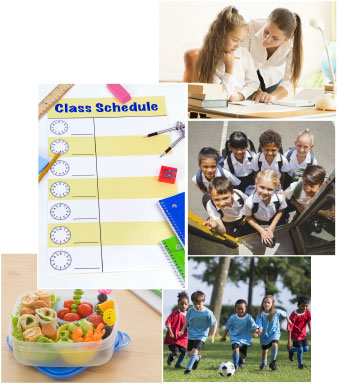Follow our 10 top tips for a painless transition into the new school year.
(1) Make Shopping Fun
If your child is nervous about starting a new school, taking them shopping for their uniform and supplies can be a good way to get them engaged. Reward good behaviour on the shopping trip with lots of praise, try to inject a sense of excitement and maybe get them to model their new uniform for siblings or friends. It’s also a good move to shop as early as possible as, the closer it gets to the start of the new term, the less likely you are to bag a bargain.
(2) Be Prepared
Ask the school for classroom supply lists before shopping for school supplies. Forewarned is forearmed … and helps protect the family budget. Items like a themed lunchbox and new pencil cases and books help make the ‘back to school’ experience more fun.
(3) Take the Tour
If the school offers an orientation tour for new students and parents, take advantage. It will give your child a welcome sense of familiarity with what’s to come and is also a good chance to meet teachers and other students.
 (4) Ease Into It
(4) Ease Into It
The first day of school is no time for a drastic adjustment of household sleep schedules. Instead, ease children back into a school year routine gradually. During the last two weeks of summer, re-introduce a school year bedtime. Begin waking late sleepers earlier and earlier, closer to the hour they’ll need to rise when school begins.
(5) Most Important Meal of the Day
Studies have shown that youngsters who eat a good breakfast benefit from better concentration throughout the day, so make sure there is time for them to eat before they leave home. Try to include protein and fibre such as eggs and sugar-free cereal in their meal.
(6) The First Day
Remind your child that there are probably a lot of students who are uneasy about the first day of school. Point out the positive aspects of starting school such as seeing old friends and meeting new ones. If necessary refresh positive memories about previous years.
(7) Pack a Snack
Kids need to eat and drink during the day and, whether they are having a school meal or taking a lunch box, giving the option to pick their own snacks and drinks will give little ones a feeling of excitement and ensure older students have something they are actually likely to consume. Fruit, baby veggies and flavoured waters are always a good option. Check the school’s policy on nuts before including these in a snack pack as other children may have allergies. Also find out the policy on drinking throughout the day as hydration is paramount, particularly in our temperatures.
(8) Master the Calendar
Make sure to get a term schedule, so you’ll know when your child will be studying which subjects and can ensure they have the correct books and equipment. As the term goes on, older kids may well take on this responsibility themselves but, at the start, it’s a good thing for you to be aware of what’s needed.
(9) After School Action
Many of the island’s schools have comprehensive after-school activity programmes. Talk to your child about developing an existing interest or exploring something new, which could open up ways to make new friends. But, though there are lots of options available, don’t allow them to take on too much, to the detriment of their school work.
(10) Home Study
From an early age, children will be required to complete study outside school hours. Create an environment that is conducive to doing homework such as a work space in their bedroom or other quite area. Help them to schedule enough time for homework. Establish a household rule that the TV and other electronic distractions stay off during homework time and supervise computer and Internet use.
Be available to answer questions and offer assistance, but never do a child’s homework for him or her and if your child is struggling with a particular subject, talk it over with their teacher to see if extra help or tutoring may be available.





































